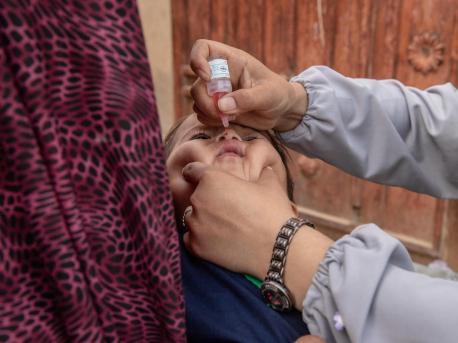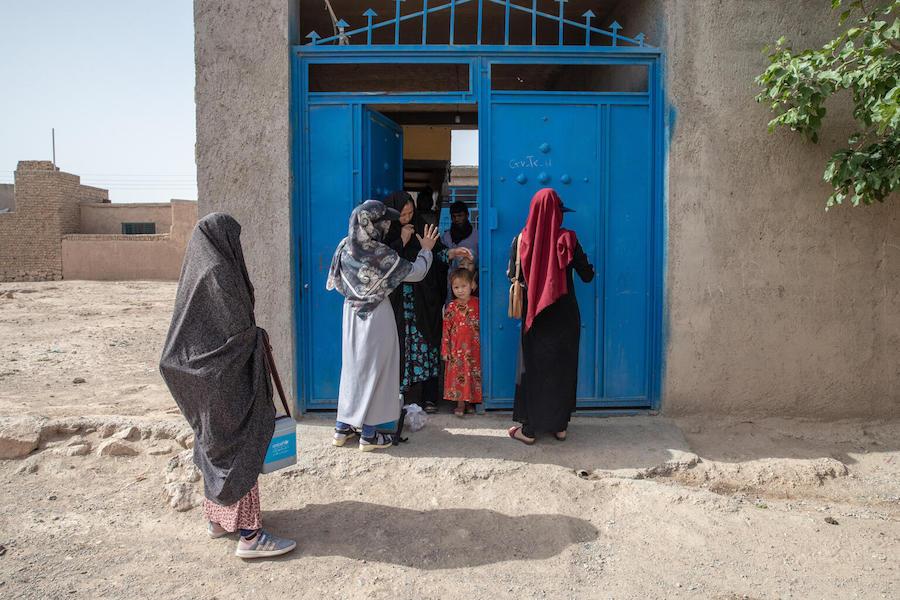
Afghanistan's Female Vaccinators Protect Hard-to-Reach Kids From Polio
Female vaccination teams in Afghanistan go where men cannot to protect every child against polio.
More than three decades after UNICEF, Rotary International and other key partners joined forces with national governments to establish the Global Polio Eradication Initiative (GPEI), the wild poliovirus remains endemic in just two countries: Afghanistan and Pakistan.
Political instability and migration back and forth along the porous, rugged border between the two countries has made it difficult to reach every child with the polio vaccine, the only form of prevention against the highly infectious, paralyzing and sometimes fatal disease.
The wild poliovirus remains endemic in only two countries: Afghanistan and Pakistan
Health workers in the region face another hurdle: religious and cultural norms forbidding unrelated men from entering a household make many mothers reluctant to open the doors of the family compound to male vaccination teams.
The solution? Female vaccinators, many of whom are mothers themselves, play a key role in encouraging parents to immunize their children against preventable diseases, building community trust and reaching children who might otherwise be missed.
Protecting Afghanistan's children from polio, one household at a time
In the video above, UNICEF Communication Specialist Veronica Houser joins a team of female polio vaccinators as they go from house to house in Afghanistan's Herat Province, vaccinating children under 5 during a national polio immunization campaign.
There is no cure for polio, only prevention
Each vaccination team visits around 120 households per day, explaining to parents that there is no cure for polio, only prevention.
"Polio is a type of virus to which children under 5 are more vulnerable," says Morvarid, one of the vaccinators. "We must vaccinate children so they do not get the virus. If a child gets the virus, they will become permanently disabled."

© UNICEF/UN0648284/Bidel
As long as polio exists anywhere in the world, the unvaccinated everywhere remain at risk: the poliovirus is just a plane ride away.
This year, new polio cases have been reported in places that have been polio-free for years, if not decades — the result of falling childhood vaccination rates caused by health system disruptions related to the COVID-19 pandemic, the difficulty of reaching children uprooted by conflict, and vaccine misinformation.
The goal of eradicating polio is still within reach
Despite recent setbacks, the goal of eradicating polio is still within reach. UNICEF and other GPEI partners are doubling down on efforts to reach every child with polio vaccines, so that no child will become paralyzed or pass along the disease to others in their community.
"The new detections of polio this year in previously polio-free countries are a stark reminder that if we do not deliver on our goal of ending polio everywhere, it may resurge globally, " Dr. Tedros Adhanom Ghebreyesus, WHO Director-General, said at the World Health Summit on October 18. "We must remember the significant challenges we have overcome to get this far against polio, stay the course and finish the job once and for all."
HOW TO HELP
There are many ways to make a difference
War, famine, poverty, natural disasters — threats to the world's children keep coming. But UNICEF won't stop working to keep children healthy and safe.
UNICEF works in over 190 countries and territories — more places than any other children's organization. UNICEF has the world's largest humanitarian warehouse and, when disaster strikes, can get supplies almost anywhere within 72 hours. Constantly innovating, always advocating for a better world for children, UNICEF works to ensure that every child can grow up healthy, educated, protected and respected.
Would you like to help give all children the opportunity to reach their full potential? There are many ways to get involved.





